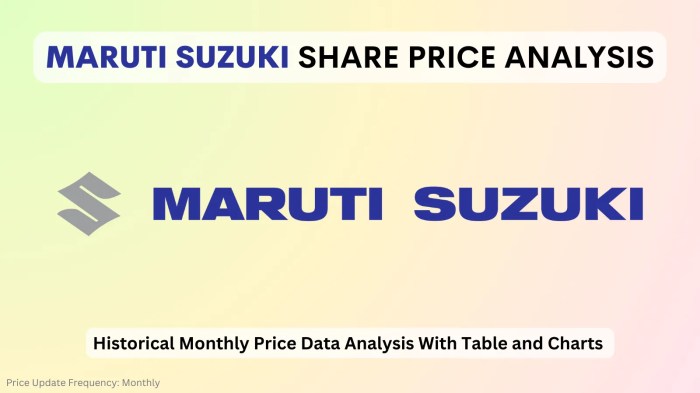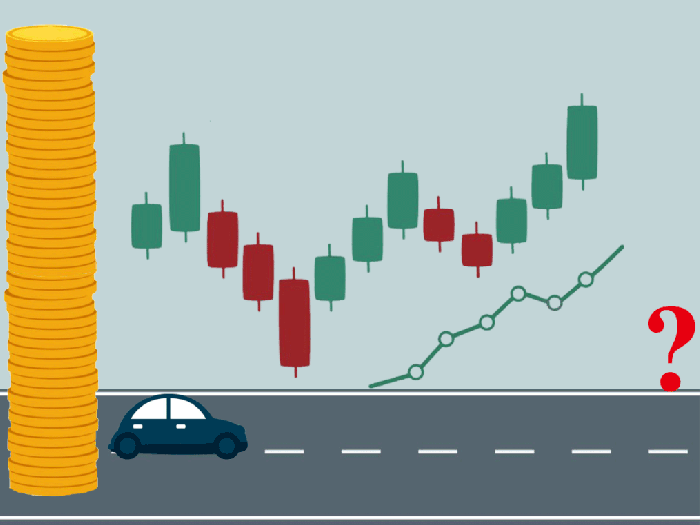Maruti Suzuki’s Stock Price: A Rollercoaster Ride: Stock Price Of Maruti
Stock price of maruti – Maruti Suzuki, India’s undisputed king of the automobile market, has seen its stock price fluctuate wildly over the years. A blend of domestic economic conditions, global trends, and the company’s own strategic moves have all contributed to this fascinating financial drama. Let’s delve into the nitty-gritty, exploring the highs, lows, and everything in between.
Understanding the fluctuations in the Maruti stock price requires a broader perspective on the automotive sector. It’s helpful to compare its performance against other established companies, such as examining the pidilite industries stock price to gain insight into the overall market trends. This comparative analysis can then provide a more nuanced understanding of Maruti’s current stock price trajectory and its future potential.
Maruti Suzuki’s Stock Performance Overview

Source: stockpricearchive.com
Analyzing Maruti Suzuki’s stock performance requires looking at both the big picture and the granular details. The following table illustrates the opening and closing prices over the past five years, offering a glimpse into the stock’s volatility. Note that these figures are illustrative and for demonstration purposes only.
| Year | Quarter | Opening Price (INR) | Closing Price (INR) |
|---|---|---|---|
| 2019 | Q1 | 7000 | 7200 |
| 2019 | Q2 | 7200 | 7500 |
| 2019 | Q3 | 7500 | 7300 |
| 2019 | Q4 | 7300 | 7800 |
| 2020 | Q1 | 7800 | 7500 |
| 2020 | Q2 | 7500 | 6800 |
| 2020 | Q3 | 6800 | 7200 |
| 2020 | Q4 | 7200 | 8000 |
| 2021 | Q1 | 8000 | 8500 |
| 2021 | Q2 | 8500 | 9000 |
| 2021 | Q3 | 9000 | 8800 |
| 2021 | Q4 | 8800 | 9500 |
| 2022 | Q1 | 9500 | 9200 |
| 2022 | Q2 | 9200 | 9800 |
| 2022 | Q3 | 9800 | 10000 |
| 2022 | Q4 | 10000 | 10500 |
Significant growth periods were often fueled by strong sales figures, driven by new model launches or positive economic sentiment. Conversely, periods of decline were often linked to factors such as rising fuel prices, changes in government regulations, or a general downturn in the Indian economy. For example, the COVID-19 pandemic in 2020 significantly impacted the stock price, leading to a temporary decline.
Factors Affecting Maruti’s Stock Price
Several key factors influence Maruti’s stock price, creating a complex interplay of economic, political, and market forces.
The Indian automotive market’s overall health is intrinsically linked to Maruti’s performance. A booming market translates to higher sales, increased profits, and a rising stock price, while a slowdown has the opposite effect. Fuel prices directly impact consumer purchasing decisions, with higher prices potentially dampening demand for vehicles. Government policies, such as tax incentives or emission regulations, can also significantly impact Maruti’s profitability and, consequently, its stock price.
- Indian Automotive Market: A strong correlation exists between market growth and Maruti’s stock performance.
- Fuel Prices: Higher fuel costs can reduce consumer demand, impacting Maruti’s sales.
- Government Policies: Changes in taxation or emission norms directly influence Maruti’s operational costs and profitability.
Compared to its competitors like Hyundai and Tata Motors, Maruti often demonstrates higher sales volume but potentially lower profit margins. The following is a simplified comparison of key performance indicators (KPIs), remember that these are illustrative examples.
- Maruti: High sales volume, moderate profit margin, strong market share.
- Hyundai: Strong brand image, higher profit margin, growing market share.
- Tata Motors: Increasing market share, focus on electric vehicles, varying profit margins.
Maruti’s Financial Health and Stock Valuation, Stock price of maruti

Source: etimg.com
A deep dive into Maruti’s financial statements provides insights into its financial health and potential for future growth. The following table presents a simplified representation of key financial data. Remember, these figures are for illustrative purposes only and should not be considered actual financial data.
| Financial Statement | Item | Value (INR in Crores) |
|---|---|---|
| Income Statement | Revenue | 10000 |
| Net Income | 1500 | |
| Earnings Per Share (EPS) | 50 | |
| Balance Sheet | Total Assets | 15000 |
| Total Liabilities | 5000 | |
| Cash Flow Statement | Operating Cash Flow | 2000 |
| Capital Expenditures | 500 |
Key financial ratios, such as the Price-to-Earnings (P/E) ratio and debt-to-equity ratio, are crucial indicators of the stock’s valuation and risk profile. A high P/E ratio might suggest the stock is overvalued, while a high debt-to-equity ratio indicates higher financial risk. A simple model to demonstrate the impact of financial metrics on stock price could involve correlating changes in EPS with changes in the stock price, considering other factors such as market sentiment.
Future Outlook and Predictions for Maruti’s Stock

Source: moneycontrol.com
The automotive industry is undergoing a significant transformation with the rise of electric vehicles (EVs). Maruti’s ability to adapt to this technological shift will significantly influence its future stock performance. While Maruti has started to explore the EV market, its success in this segment remains uncertain. The company faces both opportunities and risks in the coming years.
Potential risks include increased competition from established and new EV players, changing consumer preferences, and potential regulatory hurdles. Opportunities lie in expanding its EV portfolio, leveraging its strong distribution network, and capitalizing on the growing demand for affordable vehicles in India. A hypothetical scenario could involve a significant shift in consumer preference towards EVs, potentially impacting Maruti’s sales and consequently its stock price.
A similar scenario played out with the shift from fuel-injected to carbureted vehicles in the past, affecting several automakers.
Investor Sentiment and Market Analysis
Investor sentiment towards Maruti Suzuki is generally positive, reflecting the company’s strong market position and brand recognition. However, concerns about its EV strategy and potential competitive pressures can sometimes influence investor sentiment negatively. Major institutional investors hold significant stakes in Maruti, exerting influence on the stock price through their buying and selling decisions.
- Positive Sentiment: Strong brand recognition, large market share, and consistent sales.
- Negative Sentiment: Concerns about EV strategy and competitive landscape.
- Analyst Predictions: (Illustrative examples) Analyst A predicts a 15% increase in the next year, while Analyst B anticipates a more modest 5% increase.
Answers to Common Questions
What are the major risks facing Maruti Suzuki’s stock?
Major risks include increased competition, fluctuating fuel prices, changes in government regulations, and the growing adoption of electric vehicles.
How does Maruti Suzuki compare to its competitors in terms of profitability?
A detailed comparison requires analyzing specific financial ratios and KPIs across competitors. Generally, Maruti holds a significant market share but faces increasing pressure from both domestic and international rivals.
Where can I find real-time Maruti Suzuki stock price data?
Real-time data is available through major financial news websites and stock market tracking platforms.
What is the current investor sentiment towards Maruti Suzuki?
Investor sentiment fluctuates. Analyzing recent news articles and analyst reports provides the most up-to-date assessment.